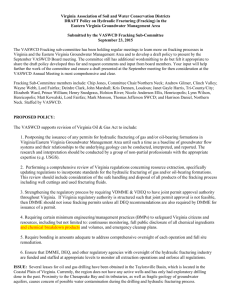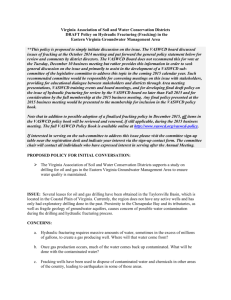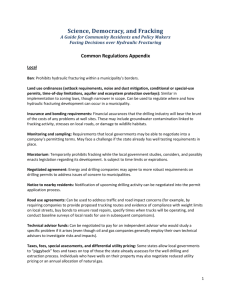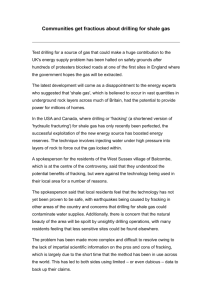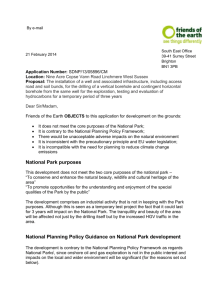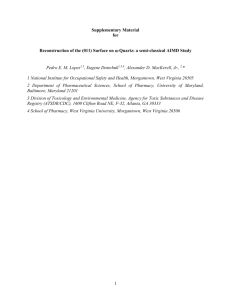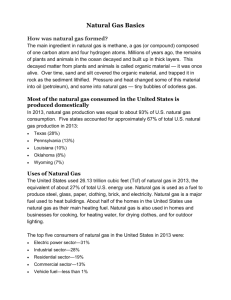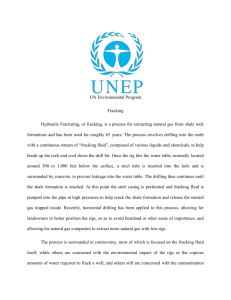Virginia Association of Soil and Water Conservation Districts DRAFT
advertisement
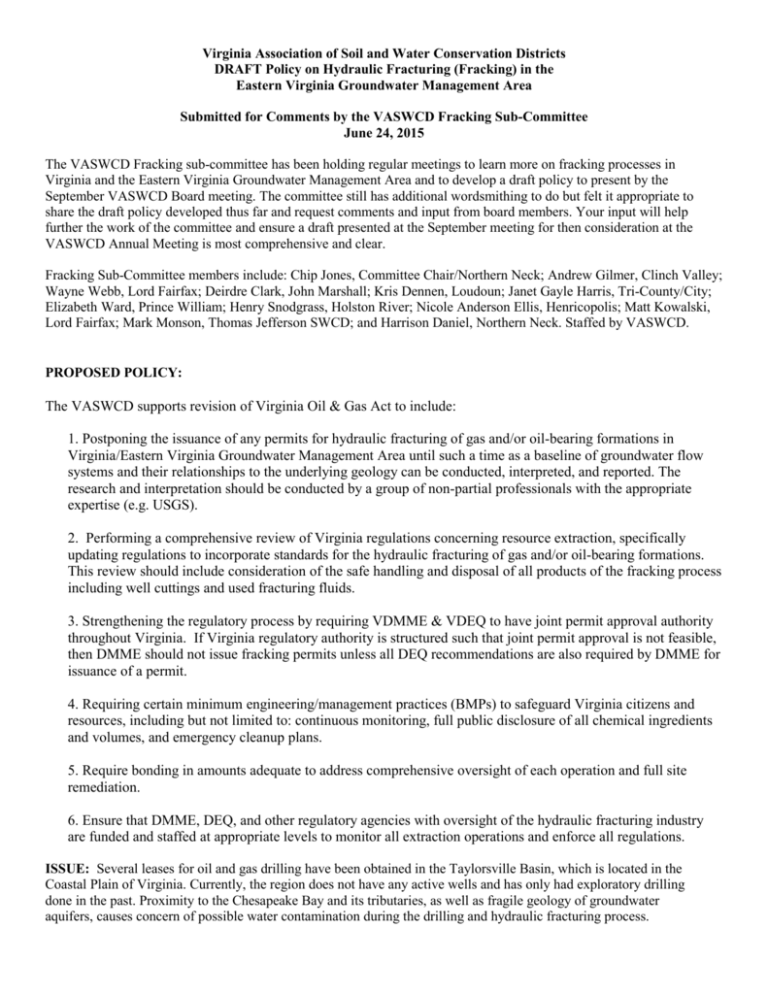
Virginia Association of Soil and Water Conservation Districts DRAFT Policy on Hydraulic Fracturing (Fracking) in the Eastern Virginia Groundwater Management Area Submitted for Comments by the VASWCD Fracking Sub-Committee June 24, 2015 The VASWCD Fracking sub-committee has been holding regular meetings to learn more on fracking processes in Virginia and the Eastern Virginia Groundwater Management Area and to develop a draft policy to present by the September VASWCD Board meeting. The committee still has additional wordsmithing to do but felt it appropriate to share the draft policy developed thus far and request comments and input from board members. Your input will help further the work of the committee and ensure a draft presented at the September meeting for then consideration at the VASWCD Annual Meeting is most comprehensive and clear. Fracking Sub-Committee members include: Chip Jones, Committee Chair/Northern Neck; Andrew Gilmer, Clinch Valley; Wayne Webb, Lord Fairfax; Deirdre Clark, John Marshall; Kris Dennen, Loudoun; Janet Gayle Harris, Tri-County/City; Elizabeth Ward, Prince William; Henry Snodgrass, Holston River; Nicole Anderson Ellis, Henricopolis; Matt Kowalski, Lord Fairfax; Mark Monson, Thomas Jefferson SWCD; and Harrison Daniel, Northern Neck. Staffed by VASWCD. PROPOSED POLICY: The VASWCD supports revision of Virginia Oil & Gas Act to include: 1. Postponing the issuance of any permits for hydraulic fracturing of gas and/or oil-bearing formations in Virginia/Eastern Virginia Groundwater Management Area until such a time as a baseline of groundwater flow systems and their relationships to the underlying geology can be conducted, interpreted, and reported. The research and interpretation should be conducted by a group of non-partial professionals with the appropriate expertise (e.g. USGS). 2. Performing a comprehensive review of Virginia regulations concerning resource extraction, specifically updating regulations to incorporate standards for the hydraulic fracturing of gas and/or oil-bearing formations. This review should include consideration of the safe handling and disposal of all products of the fracking process including well cuttings and used fracturing fluids. 3. Strengthening the regulatory process by requiring VDMME & VDEQ to have joint permit approval authority throughout Virginia. If Virginia regulatory authority is structured such that joint permit approval is not feasible, then DMME should not issue fracking permits unless all DEQ recommendations are also required by DMME for issuance of a permit. 4. Requiring certain minimum engineering/management practices (BMPs) to safeguard Virginia citizens and resources, including but not limited to: continuous monitoring, full public disclosure of all chemical ingredients and volumes, and emergency cleanup plans. 5. Require bonding in amounts adequate to address comprehensive oversight of each operation and full site remediation. 6. Ensure that DMME, DEQ, and other regulatory agencies with oversight of the hydraulic fracturing industry are funded and staffed at appropriate levels to monitor all extraction operations and enforce all regulations. ISSUE: Several leases for oil and gas drilling have been obtained in the Taylorsville Basin, which is located in the Coastal Plain of Virginia. Currently, the region does not have any active wells and has only had exploratory drilling done in the past. Proximity to the Chesapeake Bay and its tributaries, as well as fragile geology of groundwater aquifers, causes concern of possible water contamination during the drilling and hydraulic fracturing process. CONCERNS: a. Hydraulic fracturing requires massive amounts of water, sometimes in the excess of millions of gallons, to create a gas producing well. Where will that water come from? b. Procedures for the safe management and /or disposal of waste products, including recovered contaminated injection water, have not been identified. c. Fracking processes, as well as the post-fracking injection of fracking fluids, have been identified as contributors and/or causes of seismic activity in several states. . d. Drilling companies use a variety of chemicals in their drilling process, which is undisclosed because they are considered ‘trade secrets’. What impact can these chemicals have by themselves on the surrounding environment and population? . e. If drilling were to be approved in the Taylorsville Basin, the minimum engineering/management procedures that must be implemented are: 1. Department of Mines, Minerals and Energy and the Department of Environmental Quality must have joint approval authority for permits. 2. Monitoring wells must be in place in close proximity to drilling sites to ensure groundwater quality is maintained. 3. All chemicals used in the process must be publicly disclosed with such information being registered with the Virginia Departments of Mines, Minerals, and Energy, the Virginia Department of Environmental Quality, and the Virginia Department of Emergency Management. 4. All recommendations to the drilling permit application by DEQ MUST be implemented before DMME grants final approval. 5. Surface and ground water cleanup plans shall be developed for the drilling site and all downstream impacts. 6. Sufficient bond, paid by the drilling company, shall be in place to cover any potential cleanup costs of contaminated areas at the drilling site and associated impact areas, and to address the requirements of the surface and groundwater remediation plans. The Virginia Association of Soil and Water Conservation Districts supports postponing the issuance of any permits for hydraulic fracturing of gas and/or oil-bearing formations in the Eastern Virginia Groundwater Management Area until all of the concerns noted above have been addressed and appropriate mechanisms are in place to assure the protection of the environmental quality of the region.
